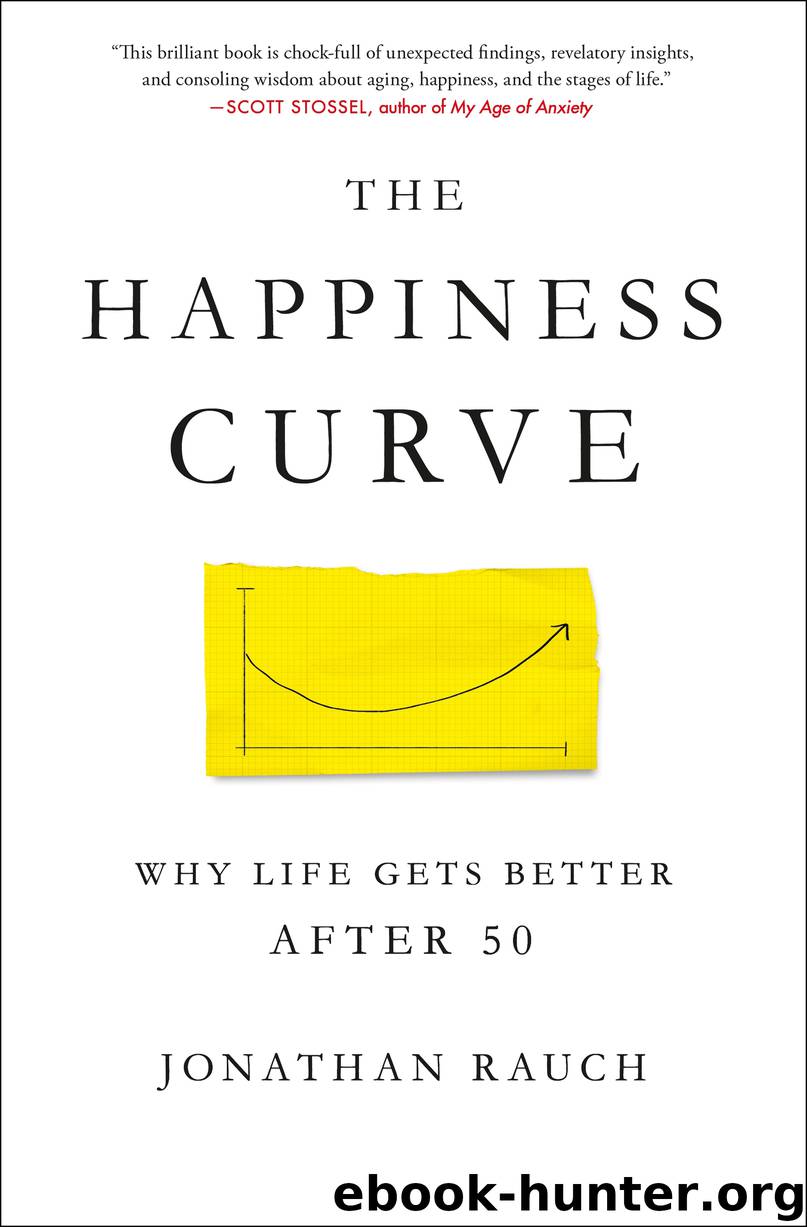The Happiness Curve by Jonathan Rauch

Author:Jonathan Rauch
Language: eng
Format: epub
Publisher: St. Martin's Press
7
CROSSING TOWARD WISDOM
The happiness curve has a purpose, and it’s social
In early 2015, the world’s best and most successful blogger shut down his website and walked away. He was fifty-one.
Andrew Sullivan was thirty-seven when he began The Daily Dish, as he called his blog. The form, then, was still new. People were already creating self-published journals online, mixing opinion with news items and links and occasionally the odd bit of reporting (and often it was odd). Some prominent journalists had taken up the form. But Sullivan took it to the next level. He had graduated from Oxford University, earned a PhD from Harvard, launched a career in journalism, and become editor of The New Republic, one of Washington’s most influential publications—all before the age of thirty. Even by the standards of Washington wunderkinds, he was a star. Blogging, though, tantalized him with an opportunity to reinvent himself and his profession. Writing in his own voice, without intermediation, he could connect directly to readers, building not just an audience but a community, thereby both exploiting and advancing an infant medium whose potential seemed boundless.
He succeeded. The Dish became a must-read for people in the United States and around the world. It pioneered a business model, managing to operate in the black at a time when traditional journalism was plunging deep into the red. It built a fiercely loyal following. And then Sullivan stopped.
A few months later, I asked him why he had walked away. He cited the mental and physical strain of running a business, of nonstop writing and editing and emailing and keeping up: “The sheer number of people you have to be in contact with. The sheer amount of data you’re processing.” He cited factors in his personal life. He cited, in other words, the stresses that can and do lead successful people to experience burnout in midlife.
But Sullivan wasn’t just tired. The river had turned. His values had changed, and his blogging work no longer aligned with them. “I was so absorbed in virtual reality,” he told me, “that I had neglected actual reality, the friends I cared about, the family I love.”
I asked about the influence and attention he was abandoning. After all, as he himself reminded me, walking away at the peak of success is “just not something one does in America.” He replied in terms that would not have surprised Laura Carstensen. “In my forties, I felt the attenuation of my ambition.” Meaning what? “It means that the worldly ambitions that I might have had, I increasingly see as distractions from the life I really want to live.”
I pressed him. What if people say, What ever happened to Andrew Sullivan? “It doesn’t bother me. I’m hardly free of ambition, vanity, or ego. But compared to my mid-twenties, it’s drastically reduced.”
I asked what he might do next. “I don’t know where I’ll be,” he said, “but I’m pretty sure I won’t be chasing after glittering prizes. And that, I think, will make me happy.”
I first met Sullivan when he was twenty-eight years old.
Download
This site does not store any files on its server. We only index and link to content provided by other sites. Please contact the content providers to delete copyright contents if any and email us, we'll remove relevant links or contents immediately.
The Four Agreements by Don Miguel Ruiz(6767)
Flow by Mihaly Csikszentmihalyi(4699)
The Four Tendencies by Gretchen Rubin(4606)
Adulting by Kelly Williams Brown(4579)
You Do You by Sarah Knight(4470)
The Hacking of the American Mind by Robert H. Lustig(4386)
Ikigai by Héctor García & Francesc Miralles(4277)
Right Here, Right Now by Georgia Beers(4217)
A Simplified Life by Emily Ley(4164)
The Art of Happiness by The Dalai Lama(4132)
The Power of Positive Thinking by Norman Vincent Peale(4068)
The Little Book of Hygge by Meik Wiking(3695)
The French Women Don't Get Fat Cookbook by Mireille Guiliano(3664)
The Heroin Diaries by Nikki Sixx(3552)
The Courage to Be Disliked by Ichiro Kishimi & Fumitake Koga(3507)
The Choice by Edith Eva Eger(3470)
Why Buddhism is True by Robert Wright(3458)
Spark Joy by Marie Kondo(3306)
Make Your Bed by William H. Mcraven(3181)
